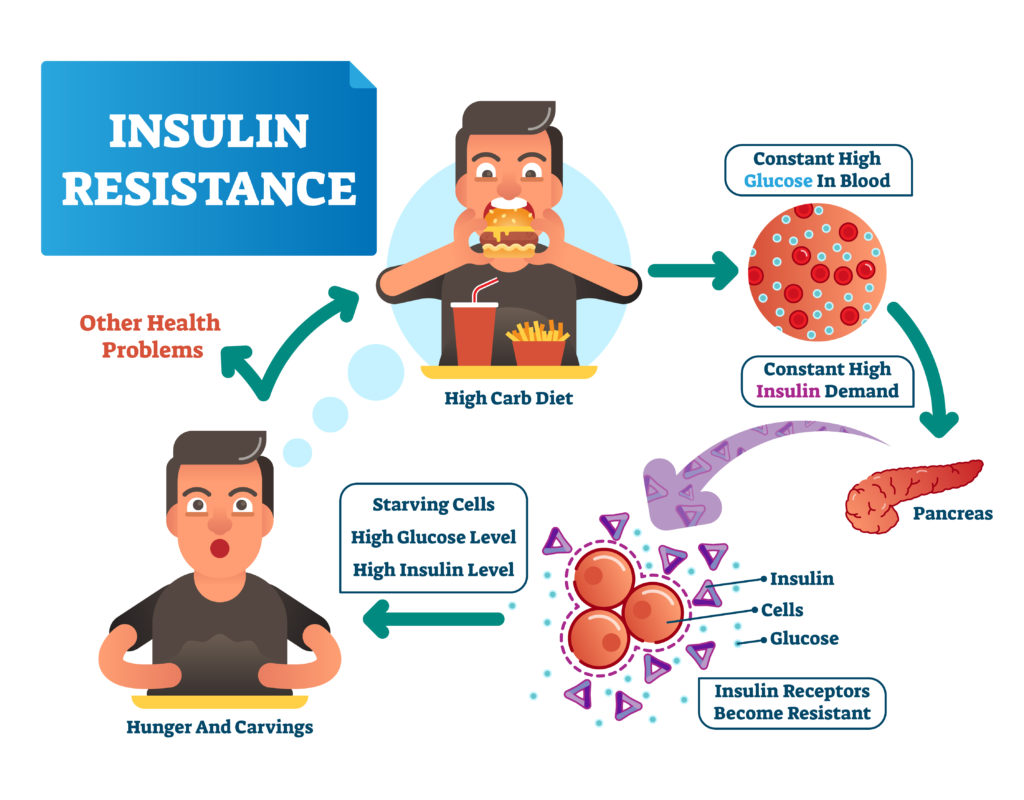Insulin resistance affects one in three people in America and can lead to serious health issues if not managed properly. But did you know the link between hormones and insulin resistance?
At Wonderfully Made Functional Medicine, Dr. Wood is dedicated to helping you understand what is happening with your body and keeping it healthy and happy. That’s why we want to ensure you know the role balanced hormones make in preventing insulin resistance.
What is Insulin?
When most of us think of hormones, we automatically think of the “sex” hormones — estrogen, testosterone, and maybe progesterone. But did you know we actually have dozens of hormones managing our bodies? Each of them has a basic function to send signals and regulate our body’s ability to function as we were designed.
Insulin is a hormone that is produced by the pancreas to help regulate the blood sugar in our bodies. The pancreas releases insulin whenever we eat or drink anything.
The insulin hormone is responsible for getting the glucose from the food we eat into the cells in our muscles, liver, fat, and other organs where it is used for energy. Insulin acts as the key to the doors of the cells.
The liver is also capable of making small amounts of insulin as needed, such as during periods between meals or when fasting.
What is Insulin Resistance?
A properly functioning pancreas will produce insulin from any sugars that enter our bloodstream from food or drinks we consume. The unfortunate truth is that typical American diets — also called “The Standard American Diet” — contain very high levels of sugar and processed foods.
The more sugar and processed food and drink you consume, the higher your blood sugar (glucose) levels spike.
As a result, the pancreas has to work harder to create insulin, which eventually results in the pancreas’ inability to keep up.
Cells in the pancreas either can’t produce enough insulin to counteract the amount of sugar or the cells in the body become “resistant” to insulin.
If not managed correctly, insulin resistance can cause more serious problems. Cells that need glucose become “starved” of energy, while glucose in the bloodstream elevates because there is no place for it to go.
Higher levels of insulin direct the body to store fat, usually around the abdominal area.
The stored fat, also known as visceral fat, can be potentially dangerous because it can cause the liver (fatty liver disease) and other organs to become inflamed.
Several studies show that fats can impede insulin from getting into the cells. Because the pancreas secretes too much insulin from all of the sugars ingested, insulin levels in the bloodstream can be five to seven times greater than they should be.
How Can You Tell if You Have Insulin Resistance?
 One major sign that you may have insulin resistance is if you carry extra weight around your abdominal area.
One major sign that you may have insulin resistance is if you carry extra weight around your abdominal area.
For females, if the waist is over 35 inches, and for males, if the waist is over 40 inches, then you very likely could be insulin resistant.
And while insulin resistance often occurs in people who are overweight or obese, that is not always the case depending on diet and lifestyle.
Thin people with a flat stomach can also have Insulin Resistance which is why it’s always a good idea to have your levels checked.
This condition also impedes the body from breaking down fats effectively, which causes weight gain, especially around the midsection.
What makes this cycle particularly vicious is that extra visceral fat can be one of the causes of insulin resistance, which becomes a “chicken and egg” situation.
Other Causes of Insulin Resistance
High Triglycerides (a form of cholesterol)
Hormone imbalances
Obesity
Diets high in processed foods and sugar
Imbalances in the gut microbiome
Genetics
Sedentary lifestyle
Inflammation
Poor sleep habits or Sleep apnea
Insulin and Hormones
 Along with insulin, our bodies produce and secrete dozens of hormones. These are the chemical receptors that tell certain organs like your heart, kidneys, ovaries, and pancreas how to function.
Along with insulin, our bodies produce and secrete dozens of hormones. These are the chemical receptors that tell certain organs like your heart, kidneys, ovaries, and pancreas how to function.
Hormones range from sex and reproductive to those that control digestion, mood, stress, and metabolism.
Many of these hormones also work with insulin to control blood sugar. And when one or more become unbalanced, you can be at higher risk for insulin resistance — which not only causes potential serious health problems but can also speed up our aging process.
What makes insulin resistance particularly dangerous is that it’s a precursor for type 2 diabetes and cardiovascular disease.
Additionally, insulin resistance can lead to metabolic syndrome, also called “Syndrome X.”
Four conditions need to exist for metabolic syndrome: hypertension, elevated glucose levels (high blood sugar), abnormal cholesterol/triglyceride levels, and excess abdominal weight.
Metabolic syndrome significantly increases the risk of diabetes, stroke, and cardiovascular disease. It can also wreak havoc on your endocrine system.
The Effect of Insulin Resistance on Hormones — and Vice Versa
Estrogen: Estrogen, in part, affects insulin. However, as we age, estrogen levels drop, which can lead to insulin resistance
Progesterone: Low progesterone levels can cause Polycystic Ovary Syndrome (PCOS), which is directly associated with insulin resistance.
Testosterone: While primarily a male hormone, women have testosterone as well. An increase in sugar in your body decreases testosterone levels and can lead to estrogen dominance and, eventually, insulin resistance.
Growth Hormone: Low or high levels of growth hormone can cause insulin resistance.
Epinephrine: Also known as adrenaline, this can impede or exacerbate glucose levels.
Cortisol: A stress hormone from the adrenal gland, cortisol controls the amount of insulin that reaches fat and muscle and signals the liver to produce more glucose. When our bodies are in a constant state of stress or anxiety, higher epinephrine and cortisol levels can cause insulin resistance.
Inadequate Sleep/Sleep Apnea: Inadequate sleep signals the body to produce excess cortisol levels.
We Can Help You Maintain Health and Vitality

At Wonderfully Made Functional Medicine, Dr. Kathryn Wood’s core belief is that we are “Wonderfully Made.” She believes that bodies are designed to function like a well-oiled machine, with all parts working in tandem to keep us healthy and living longer.
Think of your body as a symphony. If all of the active parts are performing correctly, the result is beautiful synergy. If they are not, the result could be unpleasant or even deadly.
Properly maintained hormone levels can keep our bodies functioning the way it was designed.
Dr. Wood’s commitment is to identify and address any area of your body that may be functioning abnormally. Through a series of tests, which include testing insulin and other hormonal levels, she can determine which areas need “help” in performing at the standards it was designed to.
Armed with the combined knowledge of how your body is functioning at the core level, coupled with healthy lifestyle choices, Dr. Wood can help you maintain your health and vitality at any age!
Contact our New Patient Coordinator
Call us for a consultation to see how we can help. We’ll answer any questions you have and explain our treatment approach, protocols, fees, and options. Or fill out the contact form below, and we will contact you at a time that is convenient for you.
New Patients Call: 972-214-5641
Contact Us
Contact Us by filling in the form below.
